Charles E W Bean, Diaries, AWM38 3DRL 606/1/1 - October - December 1914 - Part 12
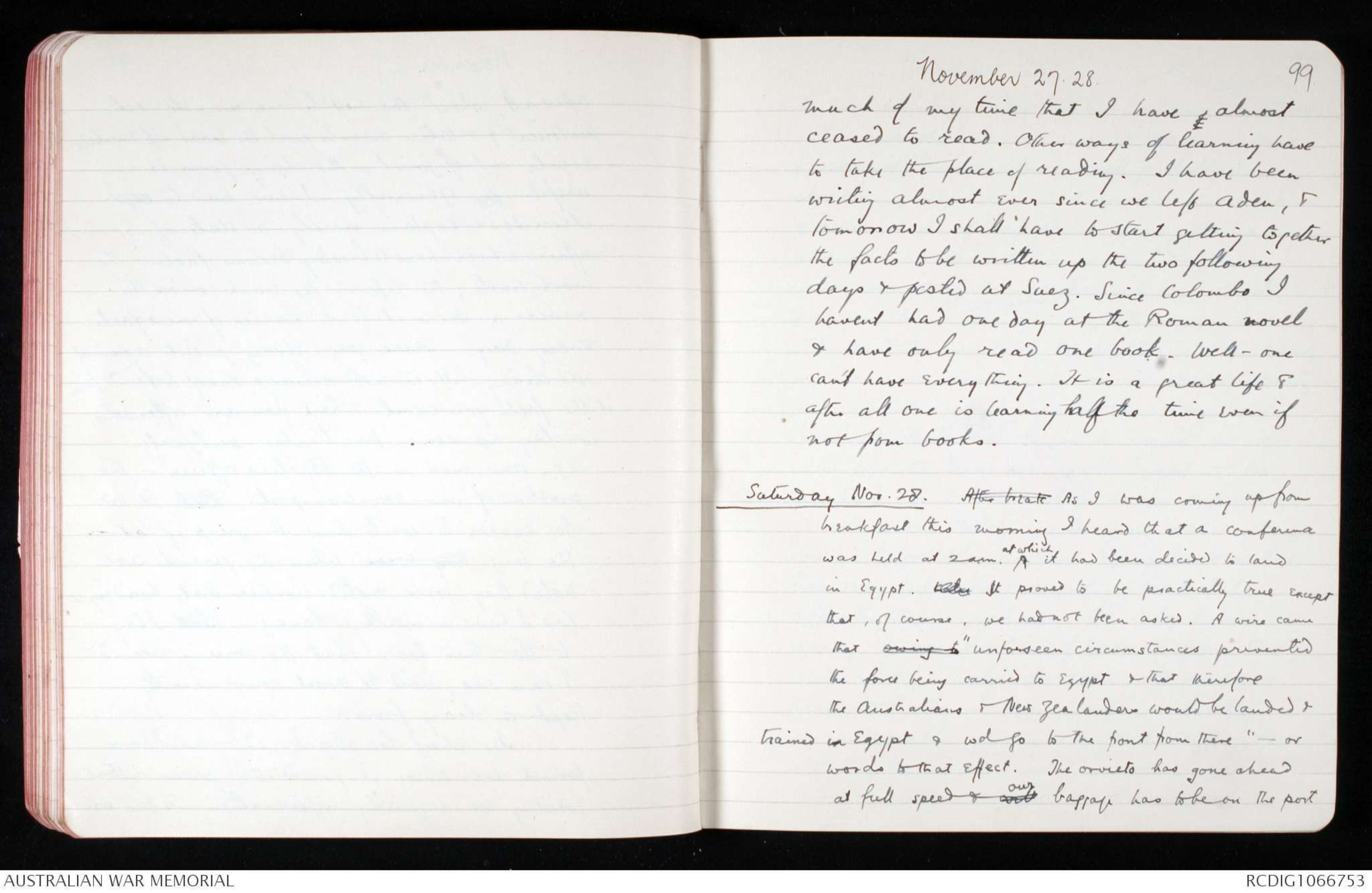
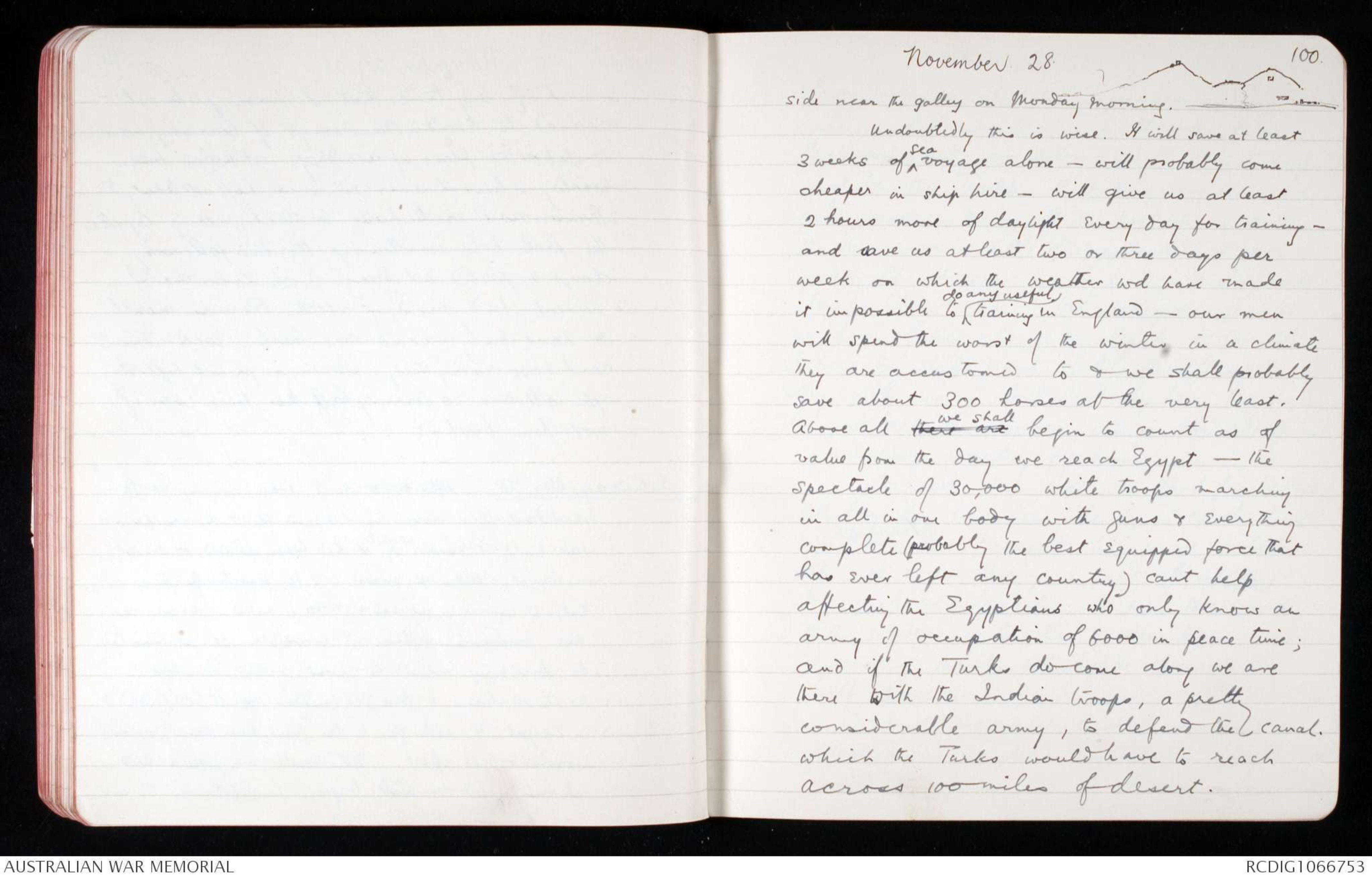
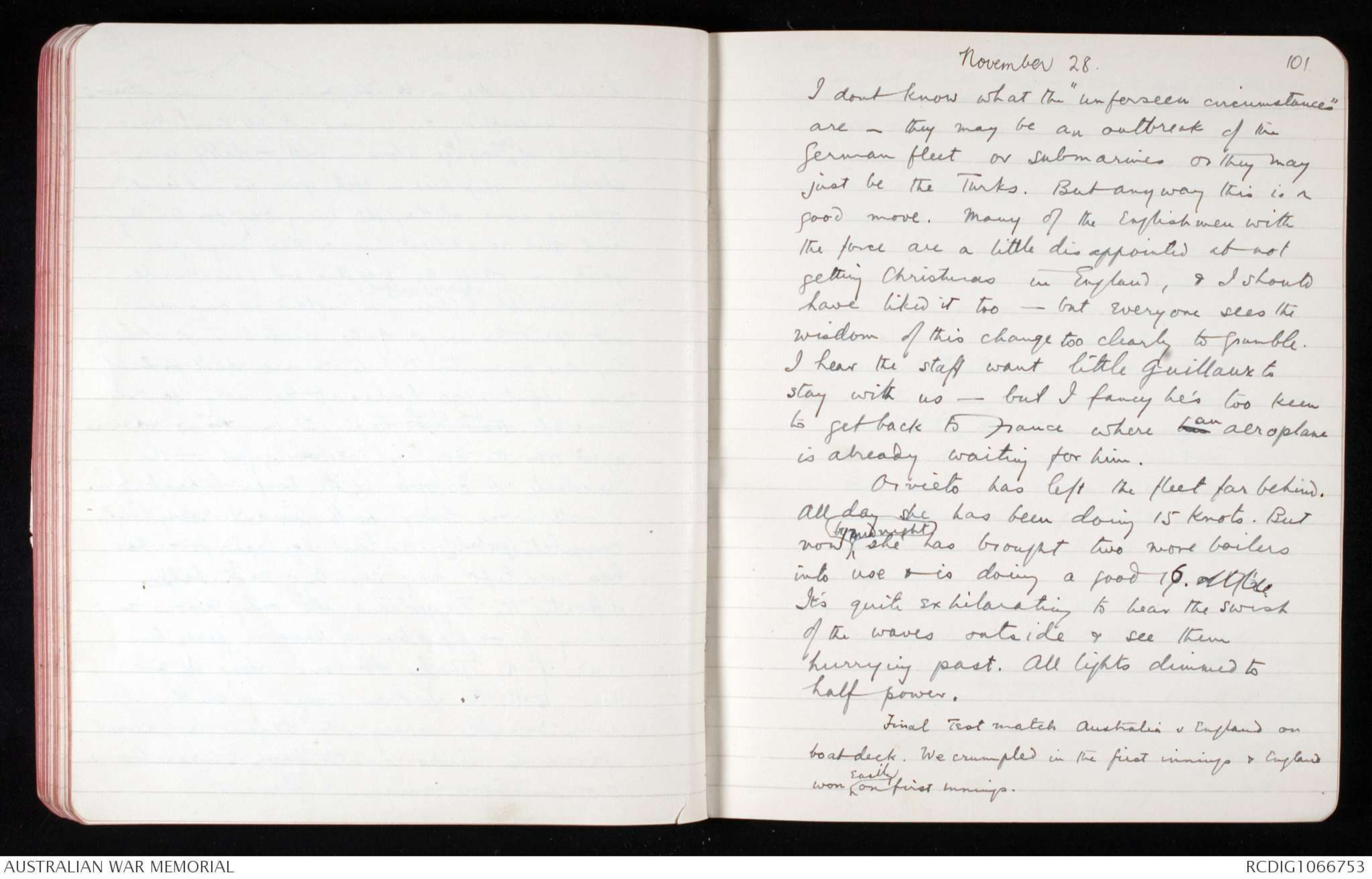
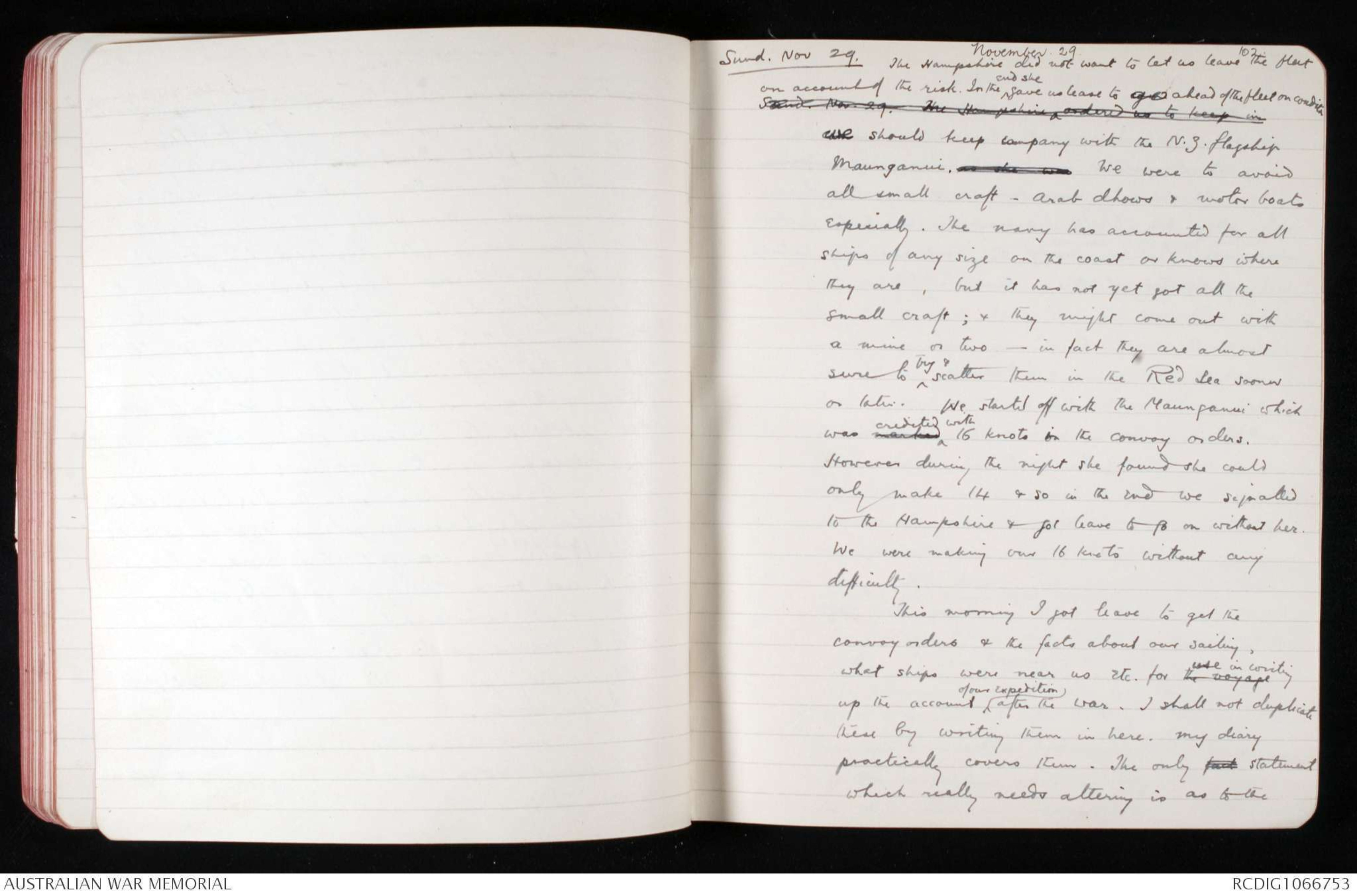
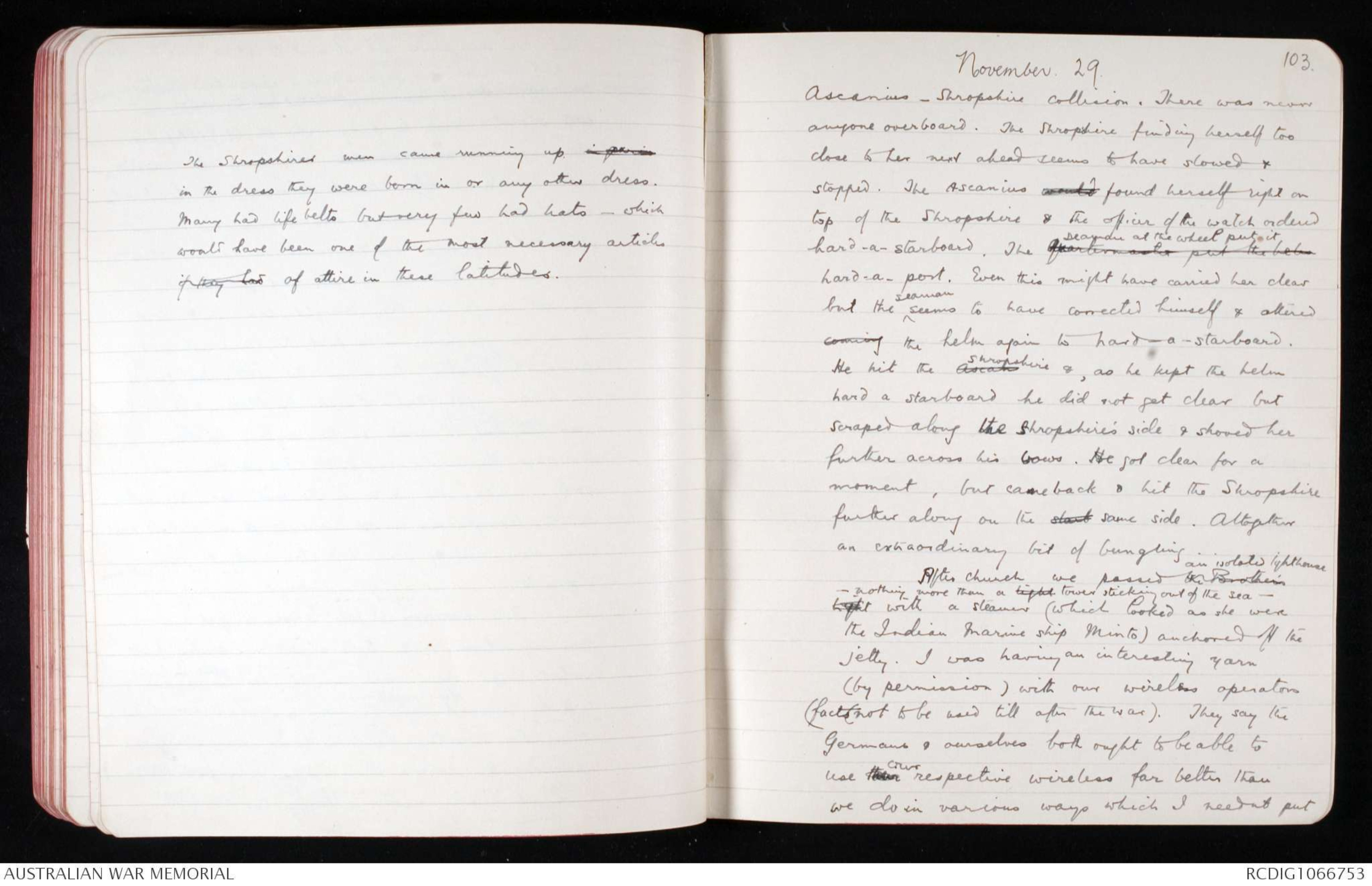
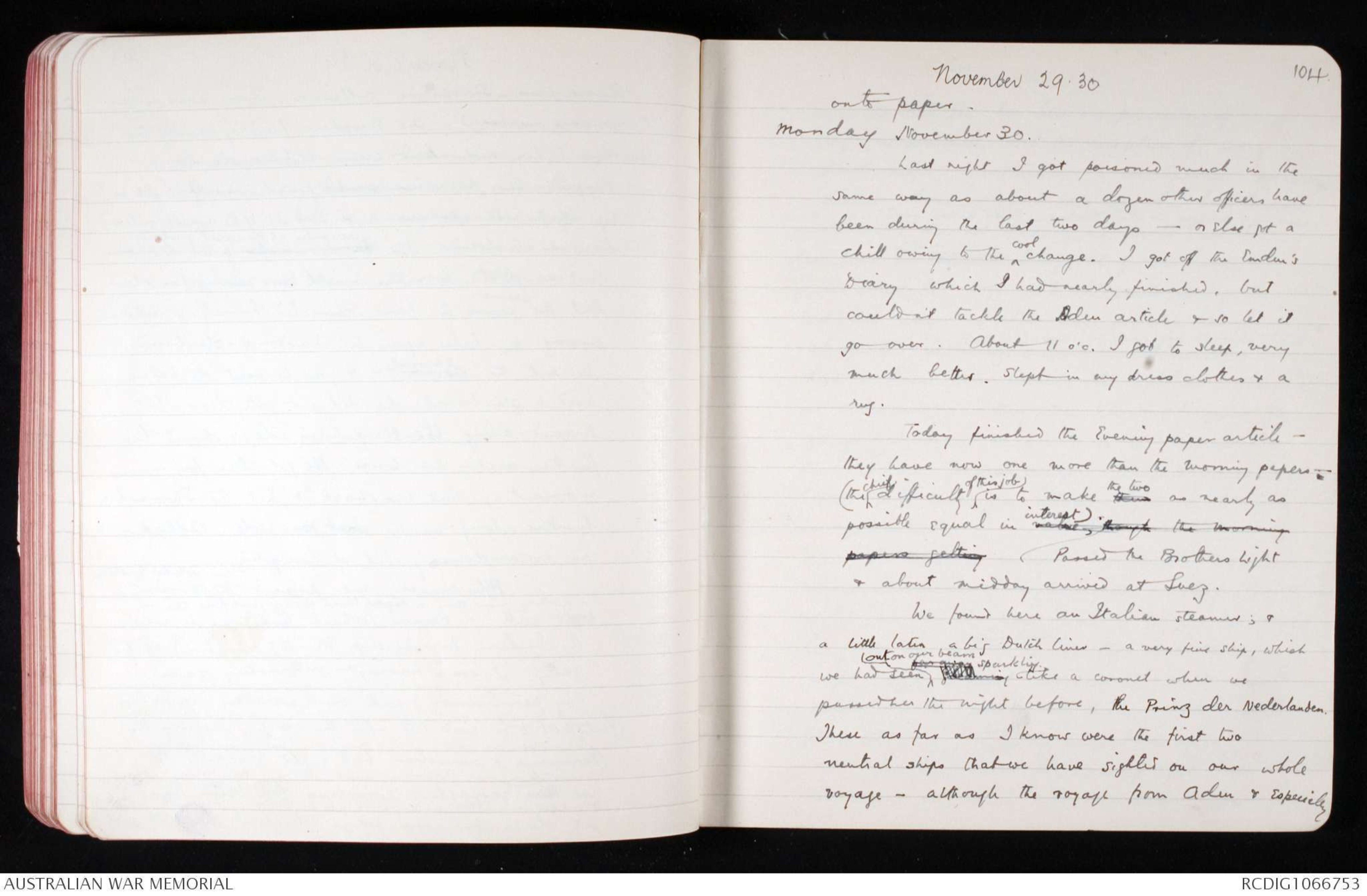
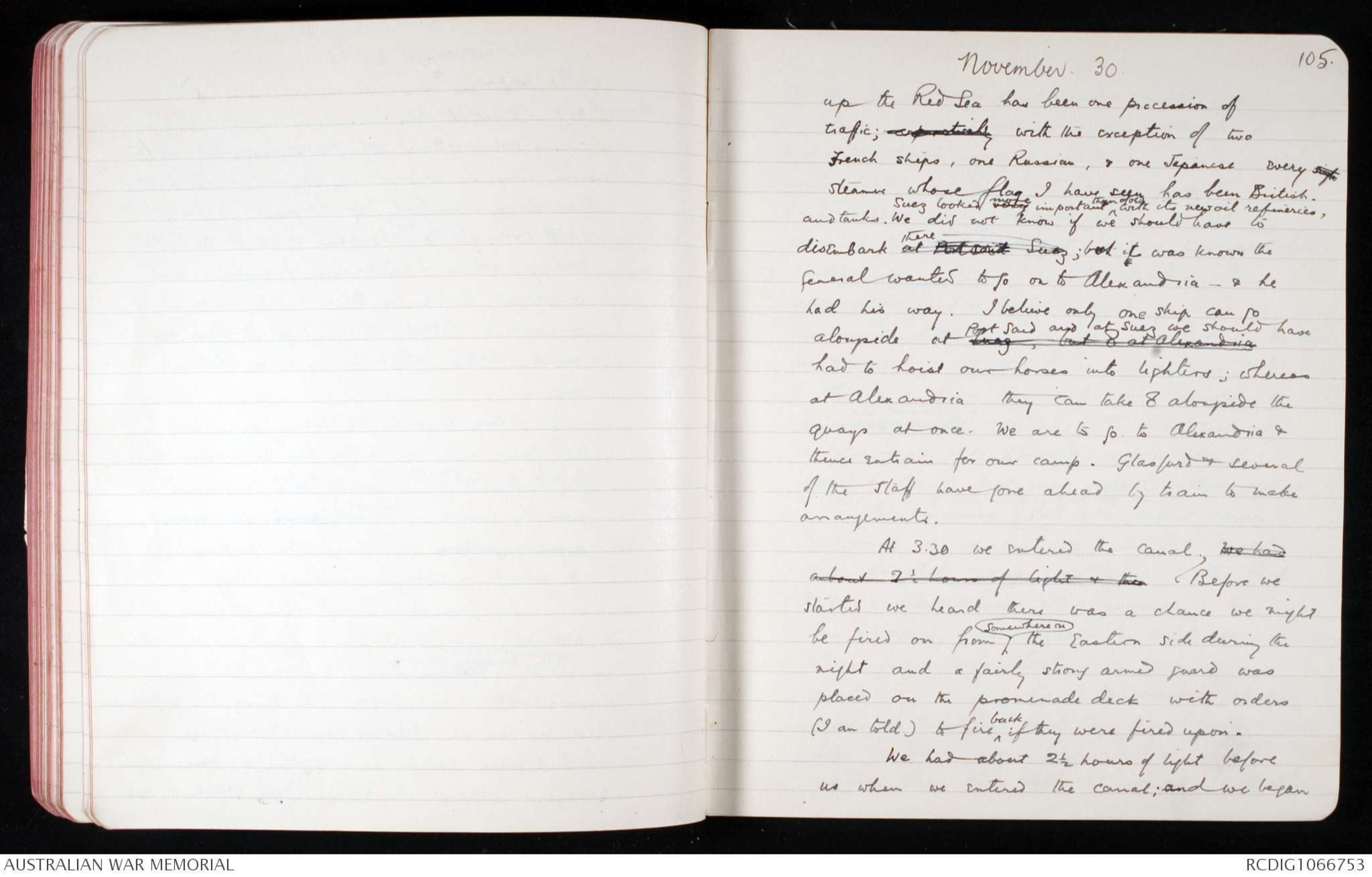
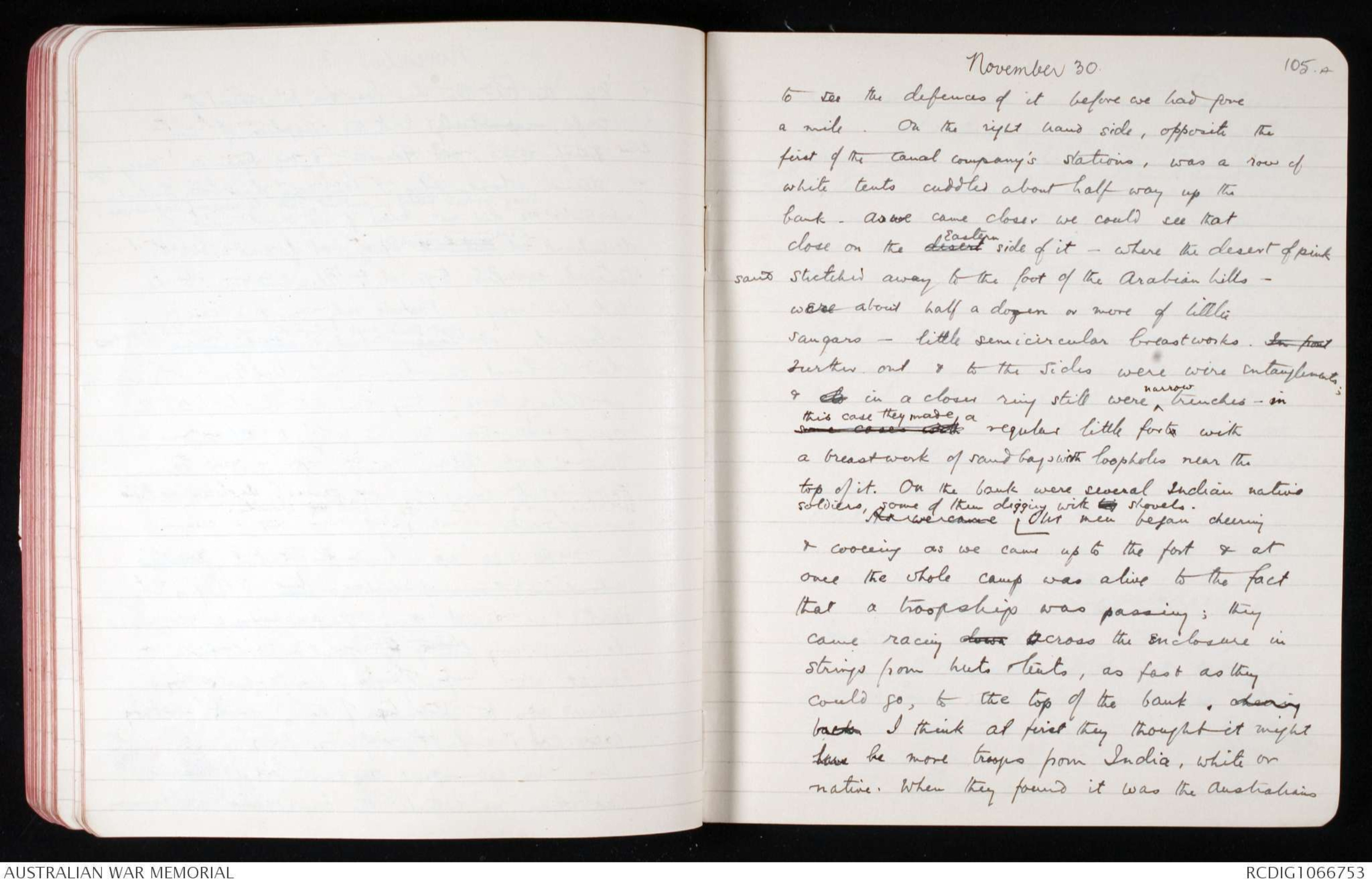
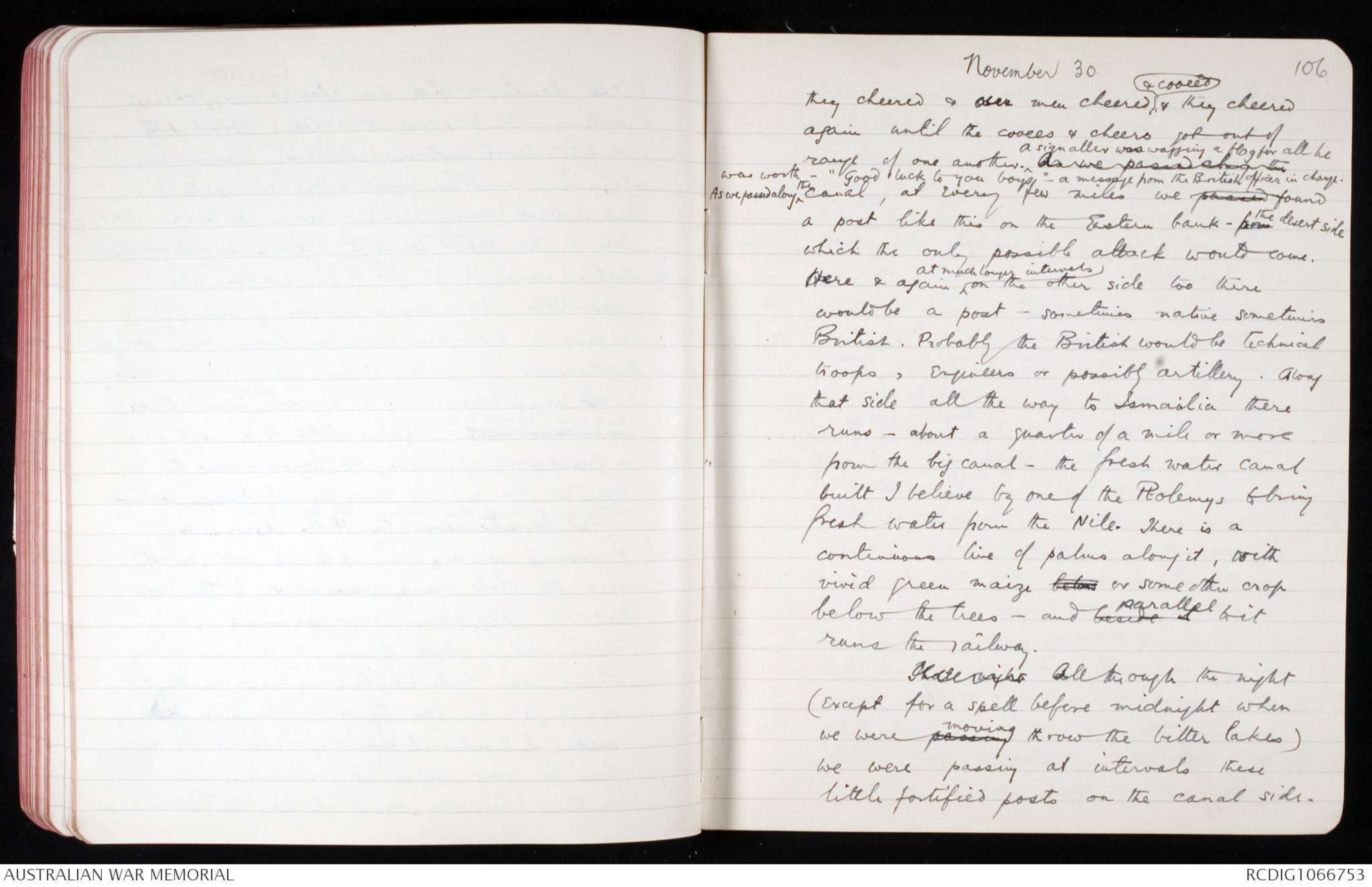
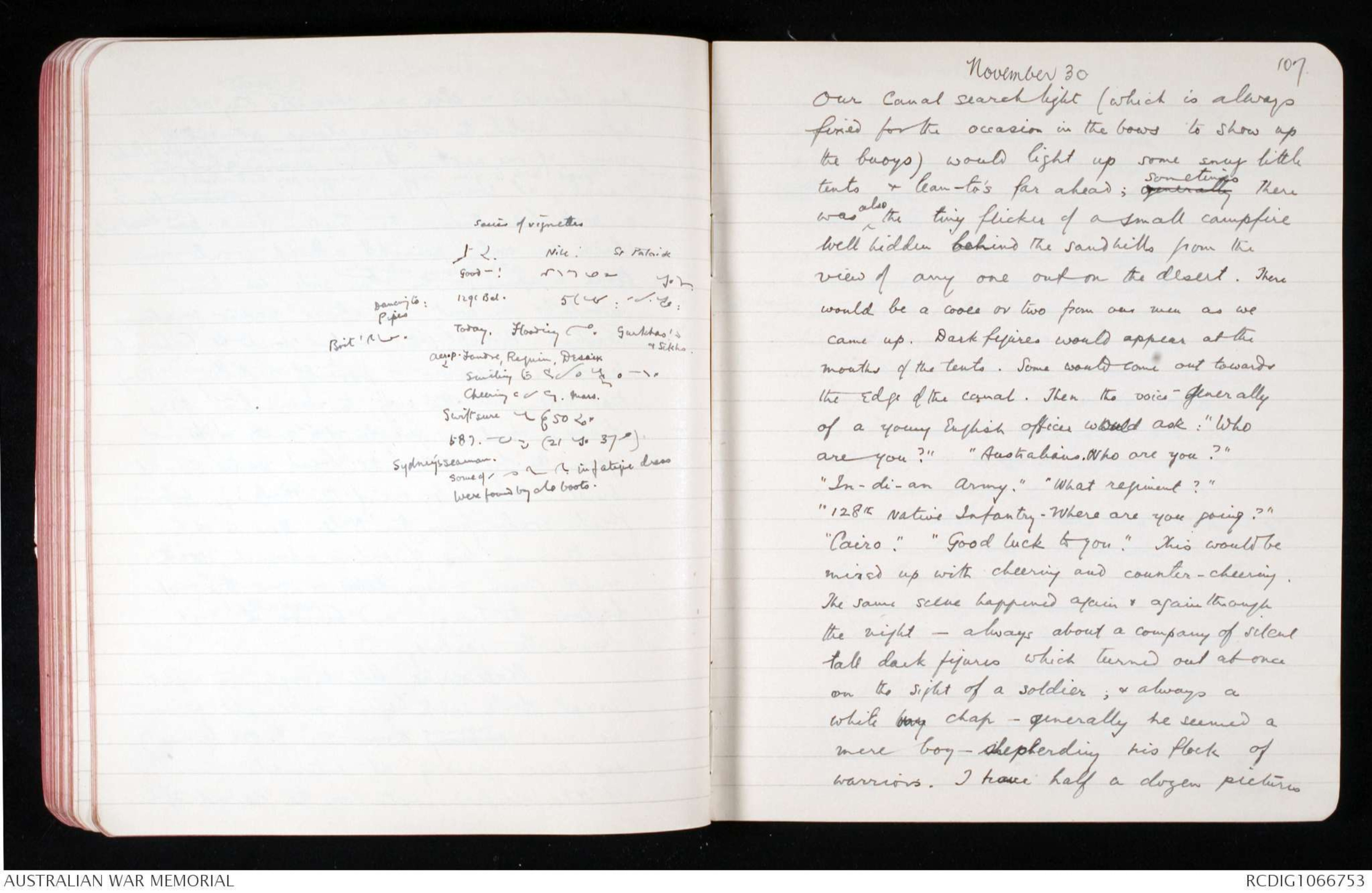
November 27.28. 99
much of my time that I have g almost
ceased to read. Other ways of learning have
to take the place of reading. I have been
writing almost ever since we left Aden, &
tomorrow I shall have to start getting together
the facts to be written up the two following
days & posted at Suez. Since Colombo I
havent had one day at the Roman novel
& have only read one book. Well - one
can’t have everything. It is a great life &
after all one is learning half the time even if
not from books.
Saturday Nov. 28. After break As I was coming up from
breakfast this morning I heard that a conference
was held at 2am. ^at which it had been decided to land
in Egypt. Today It proved to be practically true except
that, of course, we had not been asked. A wire came
that owing to “unforeseen circumstances prevented
the force being carried to Egypt & that therefore
the Australians & New Zealanders would be landed &
trained in Egypt & wd go to the front from there” - or
words to that effect. The orvieto has gone ahead
at full speed & all our baggage has to be on the port
November 28 100
side near the galley on Monday morning. [Hand drawn diagram, please see original]
Undoubtedly this is wise. It will save at least
3 weeks of ^sea voyage alone - will probably come
cheaper in ship hire - will give us at least
2 hours more of daylight every day for training -
and save us at least two or three days per
week on which the weather wd have made
it impossible to ^do any useful training in England - our men
will spend the worst of the winter in a climate
they are accustomed to & we shall probably
save about 300 horses at the very least.
Above all there are we shall begin to count as of
value from the day we reach Egypt - the
spectacle of 30,000 white troops marching
in all in one body with guns & everything
complete (probably the best equipped force that
has ever left any country) cant help
affecting the Egyptians who only know an
army of occupation of 6000 in peace time;
and if the Turks do come along we are
there with the Indian troops, a pretty
considerable army, to defend the canal.
which the Turks would have to reach
across 100 miles of desert.
November 28. 101
I dont know what the “unforeseen circumstances”
are - they may be an outbreak of the
German fleet or submarines or they may
just be the Turks. But anyway this is a
good move. Many of the Englishmen with
the force are a little disappointed at not
getting Christmas in England, & I should
have liked it too - but everyone sees the
wisdom of this change too clearly to grumble.
I hear the staff want little Guillaux to
stay with us - but I fancy he’s too keen
to get back to France where two an aeroplane
is already waiting for him.
Orvieto has left the fleet far behind.
All day she has been doing 15 knots. But
now ^by midnight she has brought two more boilers
into use & is doing a good 16. & the
It’s quite exhilarating to hear the swish
of the waves outside & see them
hurrying past. All lights dimmed to
half power.
Final Test match Australia & England on
boat-deck.We crumpled in the first innings & England
won ^easily on first innings.
November. 29. 102
Sund. Nov 29.
The Hampshire did not want to let us leave the fleet
on account of the risk. In the ^end she gave us leave to go ahead of the fleet on conditionSund. Nov. 29. The Hampshire ^ ordered us to keep in
we should keep company with the N.Z. flagship
Maunganui, as she was We were to avoid
all small craft - Arab dhows & motor boats
especially. The navy has accounted for all
ships of any size on the coast or knows where
they are, but it has not yet got all the
small craft; & they might come out with
a mine or two - in fact they are almost
sure to ^try & scatter them in the Red Sea sooner
or later. We started off with the Maunganui which
was marked ^credited with 16 knots in the convoy orders.
However during the night she found she could
only make 14 & so in the end we signalled
to the Hampshire & got leave to go on without her.
We were making our 16 knots without any
difficulty.
This morning I got leave to get the
convoy orders & the facts about our sailing,
what ships were near us etc. for the voyage use in writing
up the account ^of our expedition after the war. I shall not duplicate
these by writing them in here. My diary
practically covers them. The only fact statement
which really needs altering is as to the
The Shropshires men came running up in person
in the dress they were born in or any other dress.
Many had life belts but very few had hats - which
would have been one of the most necessary articlesif they had of attire in these latitudes.
November. 29. 103.
Ascanius - Shropshire collision. There was never
anyone overboard. The Shropshire finding herself too
close to her next ahead seems to have slowed &
stopped. The Ascanius would found herself right on
top of the Shropshire & the officer of the watch ordered
hard-a-starboard. The quartermaster put the helm seaman at the wheel put it
hard-a-port. Even this might have carried her clear
but the ^seaman seems to have corrected himself & alteredcoming the helm again to hard-a-starboard.
He hit the Ascan Shropshire &, as he kept the helm
hard a starboard he did not get clear but
scraped along the Shropshire's side & shoved her
further across his bows. He got clear for a
moment, but came back & hit the Shropshire
further along on the starb same side. Altogether
an extraordinary bit of bungling.
After church we passed the Brother's an isolated lighthouse
- nothing more than a light tower sticking out of the sea -Light with a steamer (which looked as she were
the Indian Marine ship Minto) anchored off the
jetty. I was having an interesting yarn
(by permission) with our wireless operators
(facts ( not to be used till after the war). They say the
Germans & ourselves both ought to be able to
use their our respective wireless far better than
we do in various ways which I neednt put
November 29.30 104.
onto paper.
Monday November 30.
Last night I got poisoned much in the
same way as about a dozen other officers have
been during the last two days - or else got a
chill owing to the ^cool change. I got off the Emden's
Diary which I had nearly finished, but
couldn't tackle the Aden article & so let it
go over. About 11 o'c. I got to sleep, very
much better. Slept in my dress clothes & a
rug.
Today finished the Evening paper article -
they have now one more than the morning papers -
(the ^chief difficulty ^of this job is to make them the two as nearly as
possible equal in interest)ma?acw though the morningpapers getting Passed the Brothers Light
& about midday arrived at Suez.
We found here an Italian steamer; &
a little later a big Dutch liner - a very fine ship, which
we had seen ^out on our beam far away gleaming sparkling like a coronet when we
passed her the night before, the Prinz der Nederlanden.
These as far as I know were the first two
neutral ships that we have sighted on our whole
voyage - although the voyage from Aden & especially
November 30. 105.
up the Red Sea has been one procession of
traffic; expectively with the exception of two
French ships, one Russian, & one Japanese every single
steamer whose flag I have seen has been British.
Suez looked very more important ^than of old with its new oil refineries,
and tanks. We did not know if we should have to
disembark there at Port Said Suez; but it was known the
General wanted to go on to Alexandria - & he
had his way. I believe only one ship can go
alongside at Suez, but 8 at Alexandria Port Said and at Suez we should have
had to hoist our horses into lighters; whereas
at Alexandria they can take 8 alongside the
quays at once. We are to go to Alexandria &
thence entrain for our camp. Glasfurd & several
of the staff have gone ahead by train to make
arrangements.
At 3.30 we entered the canal. We hadabout 2½ hours of light & then Before we
started we heard there was a chance we might
be fired on from ^somewhere on the Eastern side during the
night and a fairly strong armed guard was
placed on the promenade deck with orders
(I am told) to fire ^back if they were fired upon.
We had about 2½ hours of light before
us when we entered the canal; and we began
November 30. 105.A
to see the defences of it before we had gone
a mile. On the right hand side, opposite the
first of the canal company's stations, was a row of
white tents cuddled about half way up the
bank. As we came closer we could see that
close on the desert Eastern side of it - where the desert of pink
sand stretched away to the foot of the Arabian hills -
were about half a dozen or more of little
sangars - little semicircular breastworks. In front
Further out & to the sides were wire entanglements;
& cl in a closer ring still were ^narrow trenches - insome cases with this case they made a regular little forts with
a breastwork of sand bags with loopholes near the
top of it. On the bank were several Indian native
soldiers, some of them digging with shovels.As we came [ Our men began cheering
& cooeeing as we came up to the fort & at
once the whole camp was alive to the fact
that a troopship was passing; they
came racing down across the enclosure in
strings from huts & tents, as fast as they
could go, to the top of the bank. cheeringback I think at first they thought it mighthave be more troops from India, white or
native. When they found it was the Australians
November 30. 106.
they cheered & our men cheered ^& cooeed & they cheered
again until the cooees & cheers got out of
range of one another. ^A signaller was wagging a flag for all he As we passed along the
was worth - "Good luck to you boys" - a message from the British officer in charge.
As we passed along ^the Canal, at every few miles we passed found
a post like this on the Eastern bank - from the desert side
which the only possible attack would come.
Here & again ^at much longer intervals on the other side too there
would be a post - sometimes native sometimes
British. Probably the British would be technical
troops, engineers or possible artillery. Along
that side all the way to Ismailia there
runs - about a quarter of a mile or more
from the big canal - the fresh water canal
built I believe by one of the Ptolemys to bring
fresh water from the Nile. There is a
continuous line of palms along it, with
vivid green maize below or some other crop
below the trees - and beside it parallel to it
runs the railway.That night All through the night
(except for a spell before midnight when
we were passing moving throw the bitter lakes)
we were passing at intervals these
little fortified posts on the canal side.
Series of vignettes
[Shorthand - see original document] Nile: St Patrick
Good -! [Shorthand]
Dancing to
Pipes: 1291 Bel. 5 [Shorthand]
Brit [Shorthand]
Today. Flooding [Shorthand] Gurkha's
& Sikhs.
Aerop. Foudre, Requin, Desaix
Sailing [Shorthand]
Cheering [Shorthand]
Swiftsure [Shorthand]
58 [Shorthand]
Sydney's seaman.
some of [Shorthand] in fatigue dress
were found by [Shorthand] boots.
November 30. 107.
Our Canal searchlight (which is always
fixed for the occasion in the bows to show up
the buoys) would light up some snug little
tents & lean-to's far ahead; generally sometimes there
was ^also the tiny flicker of a small campfire
well hidden behind the sandhills from the
view of any one out on the desert. There
would be a cooee or two from our men as we
came up. Dark figures would appear at the
mouths of the tents. Some would come out towards
the edge of the canal. Then the voice - generally
of a young English officer would ask: "Who
are you?" "Australians. Who are you?"
"In-di-an Army." "What regiment?"
"128th Native Infantry. Where are you going?"
"Cairo." "Good luck to you." This would be
mixed up with cheering and counter-cheering.
The same scene happened again & again through
the night - always about a company of silent
tall dark figures which turned out at once
on the sight of a soldier; & always a
white boy chap - generally he seemed a
mere boy - shepherding his flock of
warriors. I have half a dozen pictures
 Julie*
Julie*This transcription item is now locked to you for editing. To release the lock either Save your changes or Cancel.
This lock will be automatically released after 60 minutes of inactivity.